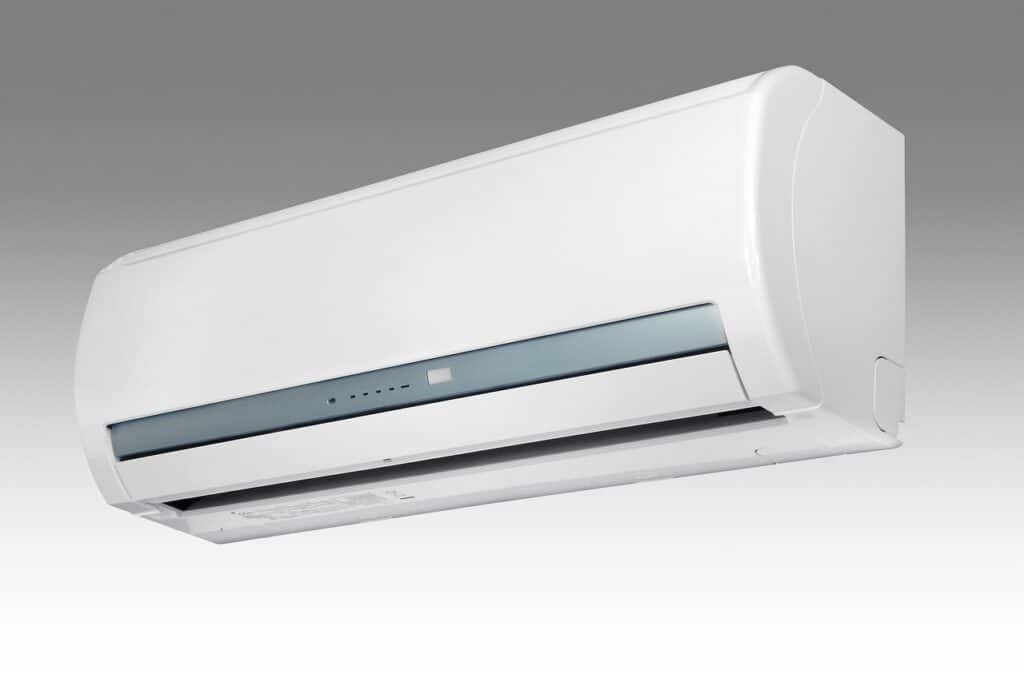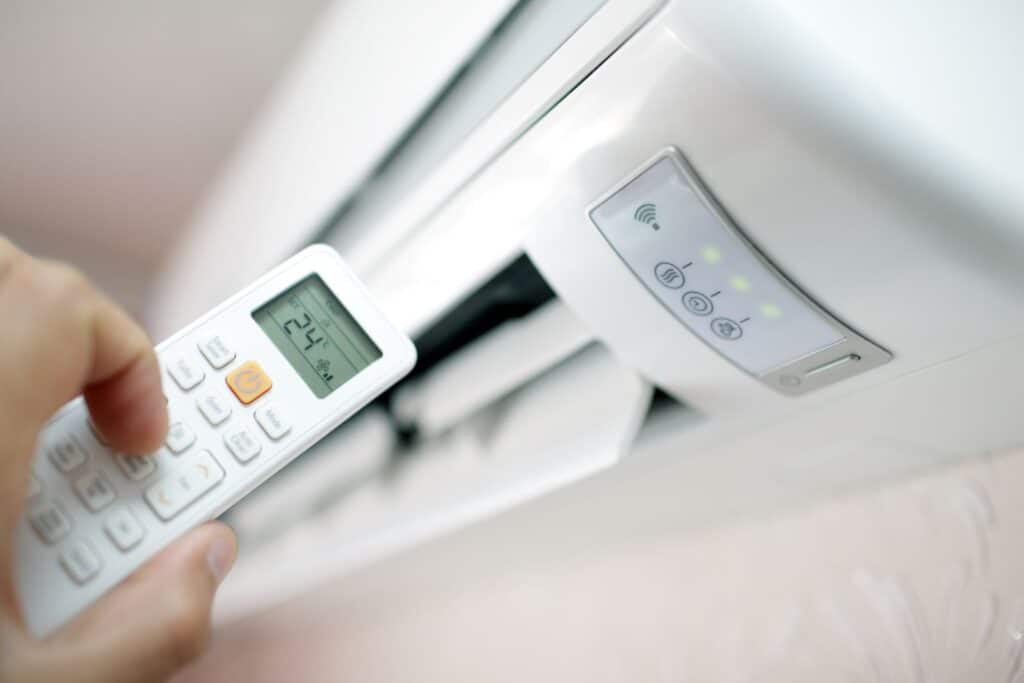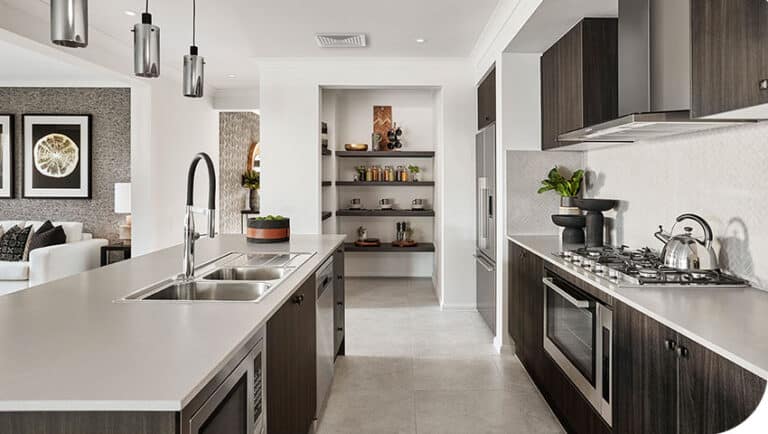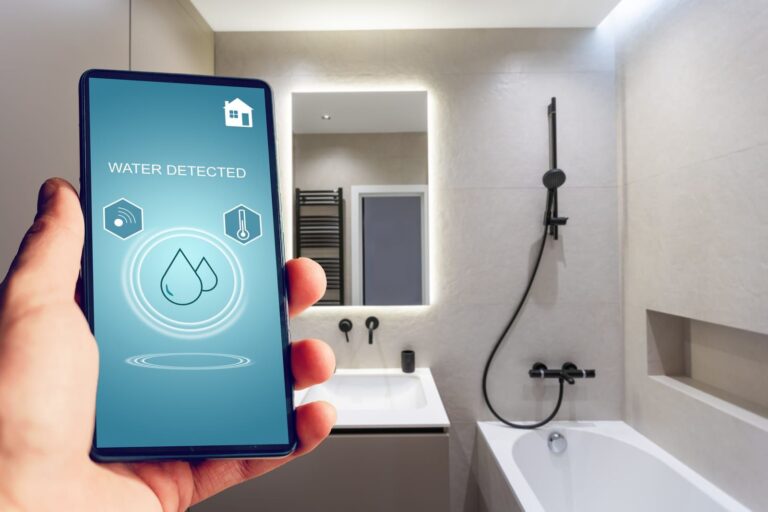Air Conditioning systems are a highly efficient and cost-effective solution for heating and cooling homes. Unlike traditional heating systems that rely on burning fossil fuels, these systems utilise a small amount of electricity to transfer heat from the air, ground, or water to warm or cool a space. This innovative technology offers several remarkable benefits for homeowners.
One of the key advantages of an air conditioning system is its ability to provide both heating and cooling. During the colder months, the system extracts heat from the outside air, ground, or water and transfers it indoors to warm up the space. In the summer, the process is reversed, and the system removes heat from indoors and releases it outside, effectively cooling the room. This versatility allows homeowners to regulate the temperature throughout the year, ensuring comfort in all seasons.
Another significant benefit of air conditioning systems is their energy efficiency. Unlike traditional heating systems, which generate heat by burning fuel, these systems simply transfer existing heat from one place to another. This transfer process requires much less energy, resulting in lower energy consumption and reduced utility bills. In fact, air conditioning systems can be up to three times more efficient than conventional heating systems, making them an excellent choice for environmentally conscious individuals looking to lower their carbon footprint.
The environmental benefits of air conditioning systems: Lowering carbon emissions and reducing your carbon footprint
One of the most pressing global issues today is climate change, primarily driven by the high levels of carbon emissions released into the atmosphere. Air conditioning systems offer a sustainable solution to combat this problem by significantly reducing carbon emissions and helping individuals and communities lower their carbon footprint.
As mentioned earlier, air conditioning systems operate by transferring heat rather than generating it, which means they require significantly less energy to produce the same amount of warmth. This reduced energy consumption directly translates to lower carbon emissions, as less energy is needed from power plants that often rely on fossil fuels. By opting for a system, homeowners can play a crucial role in reducing greenhouse gas emissions and mitigating climate change.
Furthermore, air conditioning systems also contribute to the sustainability of our environment by utilising renewable energy sources. Air source air conditioners, for example, extract heat from the outside air, which is constantly replenished by the sun’s energy. Ground source and water source air conditioning systems harness the consistent temperature of the ground or water bodies, respectively, to provide heating and cooling. By utilising these renewable energy sources, air conditioning helps create a more sustainable and greener future for our planet.

The energy efficiency of air conditioning systems: How they can help you save on energy bills
One of the most noticeable benefits of air conditioning systems is the potential for significant savings on energy bills. As mentioned earlier, air conditioers are highly efficient in transferring heat, which requires much less energy compared to traditional heating systems. This increased efficiency translates to lower energy consumption and ultimately reduced utility bills.
The energy efficiency of an air conditioner is measured by a coefficient of performance (COP), which calculates the ratio of heat output to the amount of energy input. Most systems have a COP of around 3 to 4, meaning that for every unit of electricity used, they produce three to four units of heat. This high COP value demonstrates the remarkable energy efficiency of air conditioners.
In addition to the COP, an air conditioner also offer the advantage of zonal heating. Unlike central heating systems, which heat the entire house at once, these systems allow for individual room or zone control. This means that you can adjust the temperature in each room according to your preference, avoiding unnecessary heating or cooling in unoccupied areas. By only heating the rooms you use, you can further optimise energy consumption and save on your energy bills.
Cost savings with air conditioning systems: Calculating the long-term financial benefits
While air conditioning systems may require a higher initial investment compared to traditional heating systems, the long-term financial benefits they offer make them a cost-effective choice in the long run. By considering the total cost of ownership, including installation, maintenance, and energy savings, homeowners can make an informed decision about investing in a system.
Firstly, the initial installation cost of an air conditioner may be higher than that of a conventional heating system. However, it’s essential to consider the potential energy savings over the lifespan of the system. With their high energy efficiency and reduced energy consumption, air conditioning systems can lead to significant savings on monthly energy bills. These savings can quickly add up over the years, offsetting the higher upfront cost.
Furthermore, air conditioning systems generally require less maintenance compared to traditional heating systems. With fewer moving parts and less wear and tear, these systems are more reliable and have a longer lifespan. This means fewer repair costs and lower maintenance expenses over time. Additionally, many air conditioner manufacturers offer warranties, further reducing the financial burden of potential repairs.
Lastly, it’s important to take into account the potential incentives and government rebates available for air conditioning system installations. Many countries and regions offer financial incentives to homeowners who choose to install energy-efficient heating systems like an air conditioner. These incentives can significantly offset the initial investment and make air conditioners an even more financially attractive option.

air conditioning systems for heating and cooling: Versatility and year-round comfort
One of the remarkable benefits of air conditioning systems is their ability to provide both heating and cooling, making them an all-in-one solution for year-round comfort. Unlike traditional heating and cooling systems, which require separate installations, air conditioners offer versatility and convenience.
During the colder months, air conditioning systems extract heat from the outside air, ground, or water and transfer it indoors to warm up the space. This process is highly efficient and ensures a comfortable temperature throughout the house. Whether it’s a chilly winter evening or a frosty morning, air conditioning can provide reliable and efficient heating, keeping you warm and cosy.
In the summer, air conditioning systems reverse the process and remove heat from indoors, effectively cooling the space. By extracting the warm air and releasing it outside, air conditioners provide efficient and consistent cooling. This eliminates the need for separate air conditioning units and reduces energy consumption, resulting in cost savings on both cooling and heating.
The ability of these systems to provide year-round comfort is particularly advantageous in regions with varying climates. Whether you experience cold winters or hot summers, an air conditioner can ensure a comfortable indoor environment throughout the year, allowing you to enjoy optimal temperature control and enhanced comfort.
The different types of air conditioning systems: Air source, ground source, and water source
air conditioning systems come in various types, each utilising different heat sources to provide efficient heating and cooling. Understanding the different types can help homeowners choose the most suitable option for their specific needs and circumstances.
The most common type of system is the air source air conditioner (ASAC). ASACs extract heat from the outside air and transfer it indoors to heat the space. They are relatively easy to install and require less space compared to other types of air conditioning systems. ASACs are a cost-effective solution for areas with moderate climates where the temperature does not drop too low during the winter.
Another type of system is the ground source air conditioner(GSAC), also known as a geothermal air conditioner. GSACs utilise the consistent temperature of the ground to extract and transfer heat. They are highly efficient and provide reliable heating and cooling year-round. However, GSACs require more space for installation and are typically more expensive upfront.
Water source air conditioning systems (WSAC) extract heat from a water source, such as a lake, river, or well. They are similar to GSACs in terms of efficiency and performance but require access to a water source. WSACs are commonly used in areas with abundant water resources and are an excellent choice for larger commercial buildings or residential properties near bodies of water.
When choosing an air conditioner, it’s essential to consider factors such as climate, available space, and access to suitable heat sources. Consulting with a professional HVAC technician can help determine the most suitable type of system for your specific requirements.
Air Conditioning System installation and maintenance: What to consider before investing
Before investing in a system, there are several factors to consider to ensure a successful installation and efficient operation. Proper installation and regular maintenance are crucial for maximising the benefits and lifespan of your air conditioner.
Firstly, it’s important to assess your home’s insulation and overall energy efficiency. Air conditioning systems work best in well-insulated homes that minimise heat loss. By improving insulation and sealing any air leaks, you can optimise the performance of your system and avoid unnecessary energy consumption.
Secondly, the size and capacity of the air conditioner should be carefully determined. An undersized system may struggle to heat or cool the space efficiently, while an oversized system may cycle on and off frequently, leading to energy wastage. Consulting with a professional HVAC technician can help determine the appropriate size and capacity based on your home’s square footage, insulation, and climate.
Proper installation is key to ensuring the optimal performance of your air conditioner. It’s recommended to hire a licensed and experienced HVAC contractor who specialises in air conditioner installations. A professional installation ensures that the system is correctly connected to the ductwork, electrical system, and thermostat, guaranteeing efficient operation and avoiding potential issues.
Regular maintenance is essential for keeping your air conditioner in optimal condition and maximising its lifespan. This includes cleaning or replacing air filters, checking refrigerant levels, inspecting electrical connections, and ensuring proper airflow. It’s recommended to schedule annual maintenance visits with a qualified HVAC technician to identify and address any potential issues before they escalate.
By considering these factors and investing in professional installation and regular maintenance, you can ensure the efficient and reliable operation of your system, maximising its benefits and lifespan.
Air Conditioning System incentives and government rebates: Taking advantage of available programs
Governments and utility companies around the world recognise the importance of transitioning to more sustainable and energy-efficient heating systems. As a result, many countries and regions offer incentives and government rebates to homeowners who choose to install air conditioning systems.
These incentives can significantly offset the initial investment and make air conditioning systems a more financially attractive option. They aim to encourage homeowners to adopt greener heating solutions that reduce energy consumption and carbon emissions.
Incentives and government rebates vary depending on the country or region. They can include tax credits, cash incentives, grants, or low-interest financing options specifically tailored for air conditioner installations. Some programs may require meeting specific energy efficiency standards or using certified installers, so it’s important to research and understand the eligibility criteria before applying.
To take advantage of available programs, homeowners should consult their local government or utility company websites for information on current incentives and rebates. Additionally, working with a professional HVAC contractor who is familiar with these programs can provide valuable guidance and ensure compliance with the requirements.
By leveraging these incentives and rebates, homeowners can make air conditioner installations even more affordable and accelerate the transition to a more sustainable and energy-efficient future.
Common Misconceptions about Air Conditioning Systems: Debunking Myths and Addressing Concerns
Despite the numerous benefits and advantages of air conditioning systems, there are still some common misconceptions and concerns surrounding this technology. Addressing these misconceptions and providing accurate information is crucial for homeowners to make informed decisions about air conditioner installations.
One common misconception is that air conditioning systems are only effective in warm climates. While it’s true that air source systems may experience reduced efficiency in extremely cold temperatures, modern air conditioning technology has significantly improved their performance in colder climates. With advancements in design and improved refrigerants, air conditioners can now provide efficient heating even in sub-zero temperatures, making them suitable for a wide range of climates.
Another concern often raised is the noise level of air conditioning systems. While older air conditioning models may have been noisy, modern systems are designed with noise reduction in mind. Manufacturers employ various noise-dampening techniques, such as insulated cabinets and advanced compressor technology, to ensure quiet operation. Furthermore, proper installation and regular maintenance can also contribute to minimising any operational noise.
There is also a misconception that air conditioning systems require frequent repairs and are less reliable compared to traditional heating systems. However, these systems generally require less maintenance and have fewer moving parts, making them more reliable and durable. Regular maintenance visits by qualified HVAC technicians in Brisbane, on the Central Coast or anywhere else in Australia who can identify and address any potential issues before they escalate, will ensure the long-term performance and reliability of your system.
By addressing these misconceptions and concerns, homeowners can make informed decisions about air conditioning installations based on accurate information and understanding. Air conditioning systems offer numerous benefits and advantages, and understanding the facts is essential for embracing this sustainable and cost-effective heating and cooling solution.
Conclusion: Embracing the remarkable benefits of air conditioning systems for a sustainable future
Air conditioning systems offer remarkable benefits that go beyond energy efficiency and cost savings. They provide year-round comfort, reduce carbon emissions, and contribute to a more sustainable future for our planet. By understanding how air conditioning systems work, their environmental benefits, and financial advantages, homeowners can make informed decisions about investing in this innovative technology.
From lower energy bills and reduced carbon footprint to reliable heating and cooling, air conditioning systems offer a versatile and efficient solution for homes and buildings. By embracing air conditioning, we can contribute to a greener future and take a significant step towards mitigating climate change.
If you’re interested in installing an air conditioner, consult with a professional HVAC contractor in your area who can assess your specific needs and recommend the most suitable type and capacity. Additionally, research local government incentives and rebates to take advantage of available programs that can significantly offset the initial investment.
Embrace the remarkable benefits of air conditioning systems and join the growing movement towards a sustainable and energy-efficient future. Invest in an air conditioner and experience the comfort, cost savings, and environmental advantages it offers. Make a difference for yourself and our planet.




